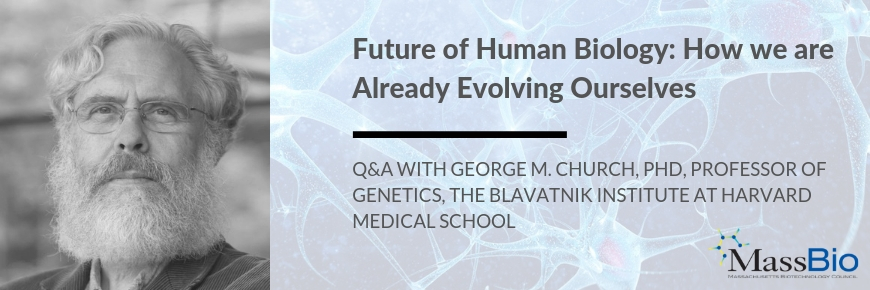
Ahead of our Annual Meeting, now the State of Possible Conference, we sat down with one of our speakers, George M. Church, Professor of Genetics, The Blavatnik Institute at Harvard Medical School, to get his thoughts on genomics and the future of human biology.
In vitro fertilization and genetically modified crops were once controversial, what among today’s biomedical issues is the most important for society to confront and address or accept?
These are still controversial – along with vaccines, evolution and climate change. IVF is an invasive procedure and lumped with abortion by opponents. Anti-GMO marketing is rising in the US and exemption of even simple DNA edits from the GMO melee is not certain. Breakthroughs come when the economic or health gains for the skeptics are undeniable. GMO insulin is accepted. Smallpox is one of the few technologies (perhaps the only one) fully equitably distributed world-wide. Neo-Darwinian evolution (biased, vast sets of random mutations) is increasingly rapid and powerful in biotech. An rapidly emerging important issue is cognitive decline in our rapidly aging population – possibly via cognitive enhancement and/or senescence reversal.
Extrapolating into the future, paint us a hopeful picture of genomics and medicine in 2069 or 2119.
NGS arose from the shadows in 2005 to first clinical use in 2010 in a NIPT trial (BGI/CGI) and now benefits over 3 million patients. CRISPR gene editing went from a wild idea in late 2012 to a billion dollar market cap in early 2016 (three companies in Cambridge MA). So five years can be revolutionary, and each additional five years seems to be exponential (not additive). Preventative medicine, cognitive medicine and aging reversal probably require much more than easy lifestyle changes – instead genetic counseling, ubiquitous 24-7 environmental and body monitoring and gene therapies. Since the markets are the largest ever (nearly all 7.5 billion of us) the prices should be globally low. Eliminating infectious diseases (HIV, TB, Malaria), nutritional (vitamin A) and environmental toxins (arsenic) could help eliminate poverty and, in turn, reduce armed conflict. Rather than reducing behaviorial or genetic diversity, we might decide to expand these dramatically as we have done for many domesticated species and technologies. We may develop genomic strategies that help us cope with the new challenges of space travel and colonization (microgravity effects on bones and fluids and radiation).
To hear directly from George Church and others on the future of human biology, register for MassBio's Annual Meeting, now the State of Possible Conference today.